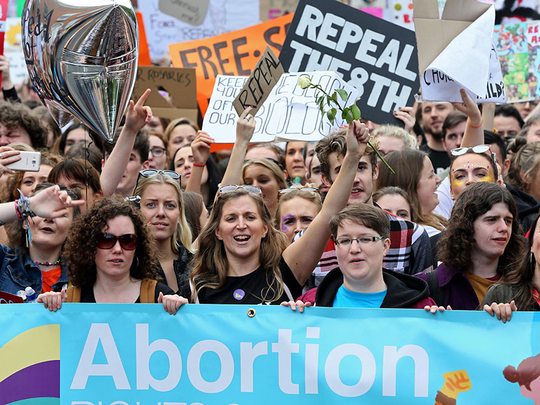
Dublin: By the end of May, voters in the Republic of Ireland will head to the polls in a referendum on overturning some of the world’s strictest anti-abortion constraints, the government in Dublin decided on Monday night.
The referendum will be the first opportunity in 35 years for some 3.2 million voters in the once staunchly conservative and Roman Catholic nation to overturn a constitution ban on abortion and that provides legal rights to the unborn.
Termination of pregnancies has been a highly emotive issue in the island, with thousands of women travelling to the United Kingdom for the procedure that is banned in Ireland, and where advertising it is also prohibited.
- Isis O’Regan | founder of pro-choice Room for Rebellion
“I cannot close my eyes and block my ears to the fact that 3,265 of our citizens travelled to the UK in 2016 from every county in Ireland,” Health Minister Simon Harris told national broadcaster RTE yesterday. “I cannot stand over a situation where the abortion pill is illegally accessed in this country and women, perhaps in the privacy of their own bedroom, in a lonely isolated place, are taking a pill without any medical supervision.”
A complete ban on abortion was lifted in Ireland in 2013 when terminations were allowed in cases where the mother’s life was in danger. The debate around that change elicited street protests from both sides and a heated debate is expected in the coming months.
Two recent opinion polls found that between 51 per cent and 56 per cent of voters would support a proposal to allow abortion up to 12 weeks into a pregnancy, with just under 30 per cent opposed and the rest undecided.
But the polls also exposed a sharp generational divide with a clear majority of voters over 65 opposed, reflecting traditional Catholic values more than 30 years ago when 95 per cent of Irish attended weekly Roman Catholic mass services.
“I know this will be a difficult decision for the Irish people to make. It is a very personal and private issue and for most of us it’s not a black and white issue, it is one that is grey,” Taoiseach (Prime Minister) Leo Varadkar said. “If it is approved, and I believe it will be approved, it will say that as a country we have come of age.”
Voters will be asked if they wish to repeal the eighth amendment of the constitution that was inserted in 1983 and enshrined the equal right to life of the mother and her unborn child, and to instead enable parliament to set the laws.
In 2015, Ireland became the first nation to approve gay marriage in a referendum.
“I went to a Catholic all-girls school there where there was no sex education and we were made to promise abstinence,” explains Isis O’Regan, the founder of pro-choice group Room for Rebellion. “When I was 16, I had to get the morning after pill. It was illegal at the time because I was underage, so I couldn’t tell my parents and I didn’t have the €80 to pay for it. I ended up stealing the money — and then I still had to convince the doctors to give it to me, after they threatened to tell my parents. It was an incredibly shameful experience.”
O’Regan argues that young people in Ireland are “brainwashed”, and that the journey to England to have abortions in secret has been normalised. “It becomes routine for these young girls to disappear and put their lives in danger,” she says. “We’re discriminated against on a daily basis. When it comes to reproductive rights, women are second-class citizens in Ireland.”
Analysts say that those who oppose abortion are more likely to vote in the referendum that will likely be held on May 25.
“I am convinced that if we concede any ground on abortion, the very same arguments which are now being used to justify abortion will be used to justify ending the lives of frail elderly people and people with significant disability, Roman Catholic bishop Kevin Doran said. “If society accepts that one human being has the right to end the life of another, then it is no longer possible to claim the right to life as a fundamental human right for anybody.
With inputs from agencies











